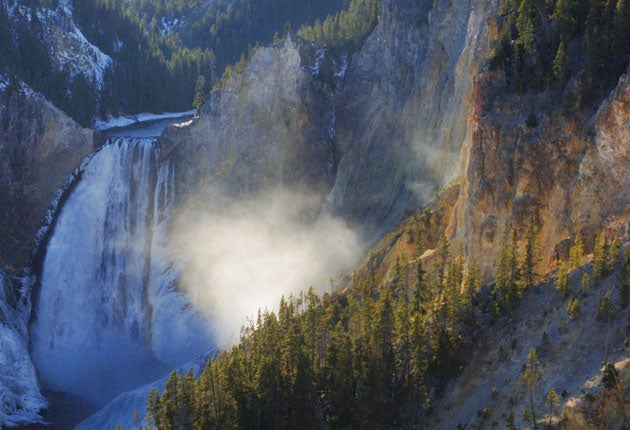Rupert Cornwell: Hate the government? Love the national parks
Out of America: A new TV series aims to persuade the US that a publicly owned service run for the benefit of the people can be a good thing

For fans of US public television with a taste for history and with plenty of time on their hands, this evening is a moment to savour. All those tedious pledge drives, all those endless repeats of ancient BBC comedies have been worth it. Ken Burns is at it again.
Over the past couple of decades, Burns has metamorphosed from mere documentary-maker to quasi-official keeper of the national memory. Baseball, jazz and, most famously, the American Civil War, are just three of the subjects that he has burnished into the country's image of itself. The style by now is familiar: languid and elegiac, yet scrupulously factual, drawing on old archive photos and footage you never imagined existed.
Thus it will be with his latest epic which begins tonight – a six-part, 12-hour series on US national parks, mixing dreamy images of some of the most beautiful places on earth with meticulously researched history. But more than any of Burns's previous efforts, this one has a contemporary relevance, unstated but glaring nonetheless.
The best way to explain, perhaps, is with a negative. Where would we be if the States had no national parks, and no National Park Service to look after them? A facetious answer would be, at least the deer might not be eating my roses. Strictly speaking, Rock Creek Park, half a mile from where I live in north-west Washington, is not one of America's 58 national parks proper like Yellowstone (the first of them all, dating back to 1872), or Yosemite in California. But it is a tiny subsidiary part of the system – a corridor of unspoiled woodland, nature trails and biking paths that stretches, quite miraculously, from suburban Maryland into the heart of the capital.
The only problem is deer, an estimated 82 of the creatures per square mile. Free from predators, they devour greenery of all sorts, with tender rosebuds a favourite. Without a park, the whole area would have been built up, a deer-free zone, and this amateur gardener would sleep more peacefully.
But what might have happened to some truly famous places is no laughing matter. The idea of the national parks, in the words of their most famous presidential advocate, Teddy Roosevelt, was that such special places "should be preserved for all the people and not confined to the rich". As it was, back in the 1870s, before New York set up a state park in the area, you had to pay a private huckster for a decent view of the Niagara Falls. The same fate might have befallen Yosemite. As for the Grand Canyon, Burns speculates, it would probably be run by a gated community.
Industrial loggers would probably have stripped every tree from the Great Smoky Mountain National Park which straddles North Carolina and Tennessee. Shenandoah National Park, with its breathtaking views of the Appalachians and stunning autumn foliage, would probably have gone the same way. Thanks to the energy and munificence of Roosevelts and Rockefellers, and the determination of countless lesser known citizens, they did not. However, these 12 hours of television are not just a celebration of a heritage saved. Burns delivers an implicit appeal, and an implicit lesson in these troubled times for America.
The appeal is on behalf of the parks themselves. A combination of free-entry weekends, reduced petrol prices and the economic crisis has turned 2009 into a bumper year. But a surge in visitors means more litter, more pollution and more strain on delicate ecosystems. This would be less of a problem if the National Park Service had been properly funded. Alas, in an age when public spending is under constant pressure and lobbyists are omnipotent, it's far easier to chop money from the NPS than persuade the military-industrial complex to forgo a couple of jet fighters. The parks' annual funding shortfall is more than $750m, while the system's backlog of maintenance projects now tops $8bn.
The lesson that Burns offers is, if anything, even more striking than his plea. Hostility to government is more vocal than ever – even as the US needs judicious reform of public policy intervention more desperately than ever.
In fact, the parks show that government, especially bipartisan government, works. As Roosevelt wanted, they are a publicly owned service run for the benefit of the public that does not discriminate between rich and poor. These days, the parks' defenders are assumed to be tree-hugging Democrats – but Roosevelt, their greatest champion, was as red-blooded a Republican as they come. Yet he, too, understood that some things are better done by government.
The politicians who today foam at the mouth over health-care reform should pay a visit to Yellowstone, the Great Smoky Mountains or any of the 56 other parks and simply chill out, humbled by the government-protected splendour around them. Failing that, they could watch Ken Burns' documentaries. And if they don't have time for that, then why not jump in a taxi from Capitol Hill to Rock Creek Park, for some contemplative downtime with those rose-eating deer?

Join our commenting forum
Join thought-provoking conversations, follow other Independent readers and see their replies